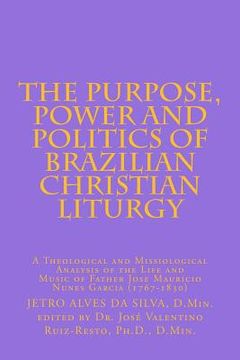Share
The Purpose, Power and Politics of Brazilian Christian Liturgy: A Theological and Missiological Analysis of the Life and Music of Father Jose Mauricio (in English)
Jetro Alves Da Silva
(Author)
·
Jose Valentino Ruiz-Resto Pd D.
(Illustrated by)
·
Createspace Independent Publishing Platform
· Paperback
The Purpose, Power and Politics of Brazilian Christian Liturgy: A Theological and Missiological Analysis of the Life and Music of Father Jose Mauricio (in English) - Ruiz-Resto Pd D., Jose Valentino ; Da Silva, Jetro Alves
$ 24.00
$ 30.00
You save: $ 6.00
Choose the list to add your product or create one New List
✓ Product added successfully to the Wishlist.
Go to My WishlistsIt will be shipped from our warehouse between
Monday, July 01 and
Tuesday, July 02.
You will receive it anywhere in United States between 1 and 3 business days after shipment.
Synopsis "The Purpose, Power and Politics of Brazilian Christian Liturgy: A Theological and Missiological Analysis of the Life and Music of Father Jose Mauricio (in English)"
In 1808, when French military and political leader Napoleon Bonaparte (1769-1821) invaded Portugal, Prince D. Joao VI (1767-1826) fled to Rio de Janeiro and eventually obtained governance of Brazil. As a first step, he appointed his own bishop and other persons in charge of the cathedral there, who in turn influenced how Father Jose Mauricio Nunes Garcia (1767-1830), the Mulatto chief musician of the cathedral from 1808 to 1811, functioned theologically, musically, and culturally.Along with other Mulatto chapel masters like Francisco Gomes da Rocha (1745-1808), Marcos Coelho Neto (1740/1746-1806), and José Joaquim Emerico Lobo de Mesquita (1746- 1805), Father Garcia adjusted cultural demeanor and his musical compositions to meet the expectations of Prince D. Joao and his officers. As a result, Father Garcia's work beard no clear witness to his "Afro-Brazilian" musical influences, and was presented like that of a Portuguese European. This current study examined Father Garcia's case to exemplify how the political climate of Brazil influenced Christian liturgy and may have even hindered its indigenous musical expression. Father Garcia's compositional style lacked traces one of his African-Brazilian heritage which suggests he was likely under the influence of the colonial authorities, having to conceal key aspects of his identity and adjusted his musical performances to please the Portuguese rulers. Furthermore, this study explored the prevailing mindset of his day and three of Garcia's eight unpublished manuscripts with Ladainhas [Litanies]. Finally, various impacts of colonial politics on indigenous Brazilian Christian liturgists and their patterns of worship were discussed in this case study.

